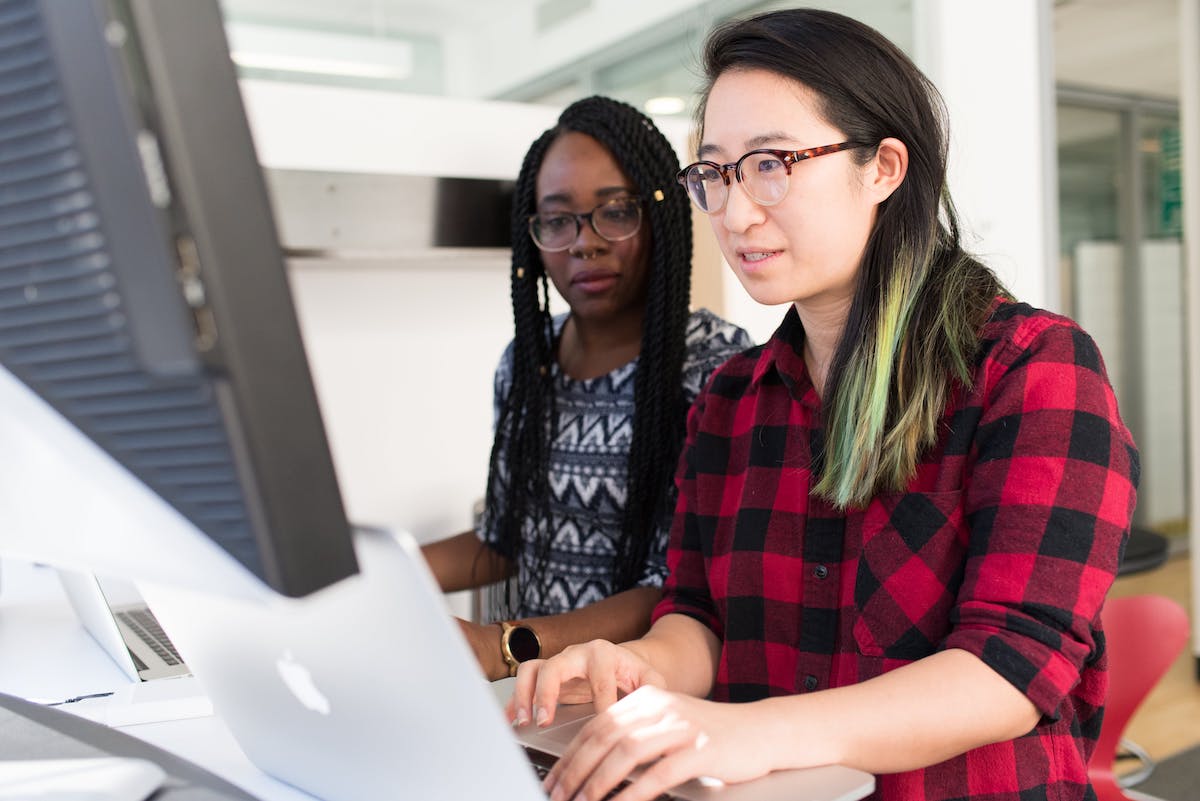
UNIVERSIDAD 2024
AIAP® SINGAPORE
By Laurence Liew, Director of AI Innovation at AI Singapore
Growing our own timber – one apprentice at a time.
When AI Singapore (AISG) started in June 2017, we were tasked to help 100 companies build their AI products and solutions through the 100 Experiments (100E) programme. We started with four (4) AI engineers/data scientists with co-workers from my previous organisations I persuaded to join me. We then put out a recruitment advertisement, and we received around 300 resumes, of which only ten were Singaporeans resumes. I only managed to hire 1 Singaporean to join our team – He is still with us today.
Being a government-funded programme and hosted by a local university, our salary structure and incentives could not match what the industry was willing to pay. How can we build up an AI Engineering team to meet our 100E KPIs when we have big tech giants such as Google, Microsoft, Grab, Facebook, etc., looking to hire the exact talent profiles in Singapore?
AI Apprenticeship Programme
AI Singapore launched the AI Apprenticeship Programme (AIAP)® in early 2018, where we deliberately hunted for AI talents with only two criteria:
We purposefully avoided stating the academic qualifications the candidate needs to have, such as a computer science or engineering degree with a specialisation in AI or ML. Instead, we stated the skills and knowledge the candidate needed to have to join the apprenticeship programme. We looked for talents that could be nurtured and developed in a short period of time.
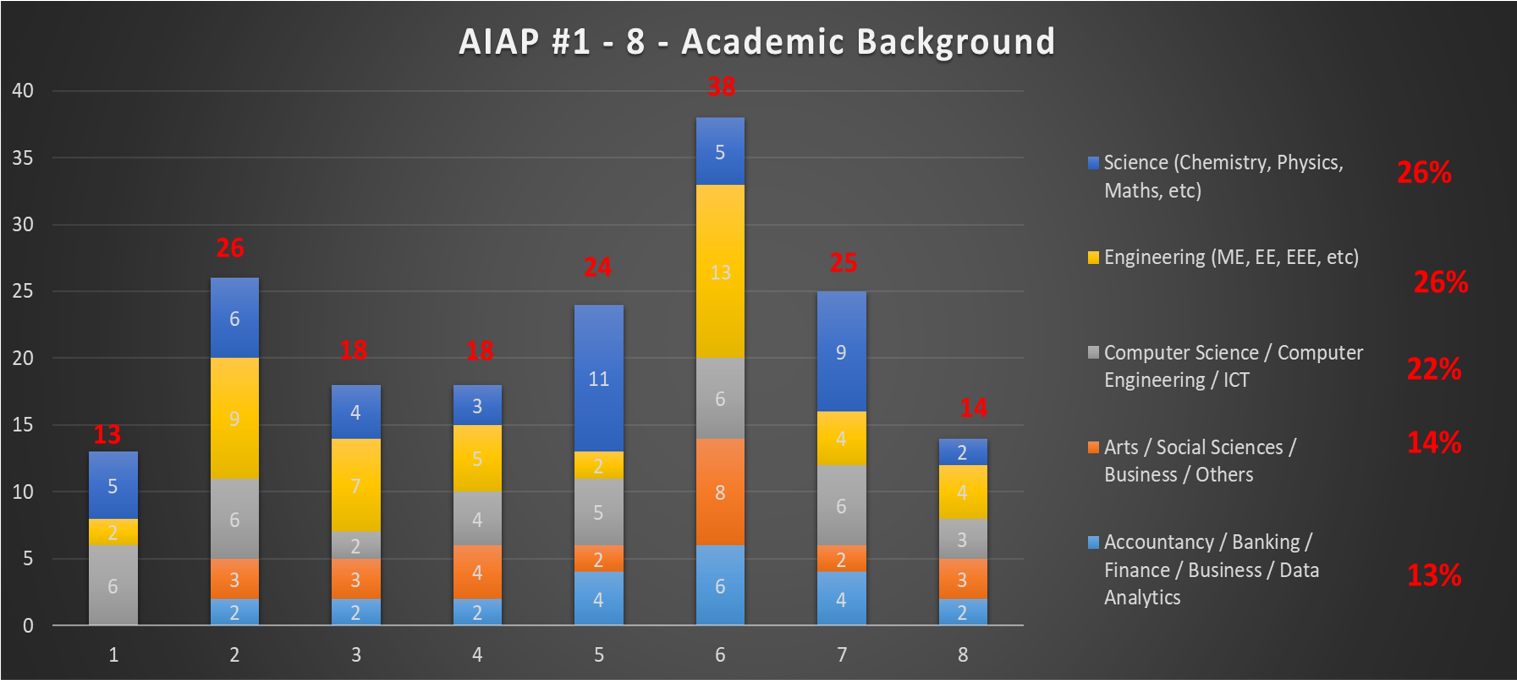
Hence, we looked for passionate individuals who probably self-taught themselves AI/ML and Python (or R) programming and basic software engineering skills. They typically would have gone online and participated in various MOOCs or read up and practised their AI/ML skills on platforms such as Kaggle; are familiar with cloud computing and data management. Only some would have formal education in AI/ML at the university level.
One of the biggest misconceptions that hiring managers have is that only Computer Science graduates can do AI and ML. Some of my best AI engineers and data scientists have degrees in economics, psychology, business, biology or industrial engineering.
We have found that the ability to learn fast, passion for solving data problems, and the love of working with data is key to being a good AI Engineer or Data Scientist. Everyone can learn to program. Not everyone has a passion for data and using data to solve a business problem.

This strategy has worked out exceedingly well for us as we have found passionate individuals from various disciplines who have decided to cross over to the AI/ML sector. They have taken it upon themselves to learn AI/ML at a deep level. Some have spent up to 3 years pouring over their old university mathematics and statistics books.
What they lacked was the opportunity to apply their knowledge to a real-world AI/ML business problem. The AIAP provided the chance to work on a real-world industry AI project (100E is explained in the next section) or an internal AI Singapore project to build AI/MLOps platform tooling, AI solutions and products (AI Bricks).
The project phase of 7-months is executed in-house in AI Singapore premises. AI engineers are assigned to the 100E project work together with the apprentices who are treated like the full-time staff of AI Singapore, and they are in turn supported by our AI/ML Dev Ops and Data Engineering team and the various AI Heads who are experts in the various fields of AI/ML.
Internship vs Apprenticeship
We do not believe in the internship model where “students” are sent to an organization to intern. In our AIAP apprenticeship model, we hot-house the apprentices. This accelerates their learning and skills. And by working so closely with their peers daily and in an environment where everyone eats-drink-sleep AI/ML and deployment, real-world AI projects get delivered.
The end outcome is a Minimum Viable Product (MVP) co-created by AI Singapore and the sponsoring organisation. The combined team will typically work on 10-15 sprints over 7-months and deploy the model into production by the last month. In Foster’s 2013 Data Science for Business book on page 321 – he says:
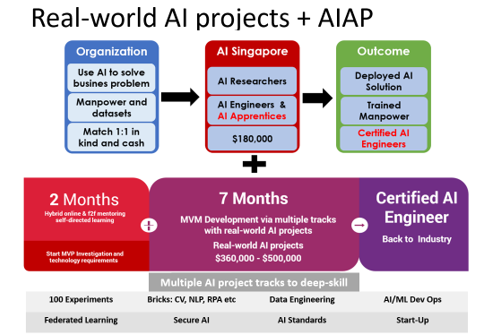
The AI Apprenticeship Programme is one such learning path. The Singaporean AI apprentices will be mentored by AISG’s AI mentors, some of whom might have gone through the apprenticeship programme themselves only a few months earlier.
The 100 Experiments (100E)
The 100E programme is where AI Singapore matches and assembles a team of AI scientists, AI engineers, and AI apprentices to help an organisation solve their AI problem statement. The organisation brings the problem statement, dataset, domain expertise, engineering/IT resources and co-funding. For a project to be undertaken by AI Singapore under the 100E programme, the company must meet the following criteria:
AI Singapore has engaged more than 700 companies and 15,000 professionals through our outreach and industry programmes to date. We approved 115 projects; completed and deployed 73 of the 100Es into production (as at Oct’23)
AI Singapore has done projects in nearly all of Singapore’s primary industry clusters!
Increasing the number of AIAP Apprentices
Over the last 14 batches, we have seen the following: there is a 50% dropout for each of the stages of the AIAP recruitment. If we receive 200 applications, we will only receive around 50% or 100 submissions for the technical assessment (TA). Of the 100 who submitted, only about 50% will pass. We will then invite these 50 to the interview; typically, only 50% will pass the final interview stage. So we are left with 25 candidates to whom we will make an offer for the AIAP programme.
So, to grow the AIAP cohort and at the same time maintain the same standard of intake, we can do two things:

This article will focus instead on getting more applicants who already know of AIAP and studying to pass the technical assessment. For aspiring AIAP™ applicants, this field guide provides a structured 12 to 18 months learning pathway to attain the requisite level for acceptance into AIAP™.
For experienced applicants to AIAP™, this field guide provides the necessary knowledge required, and applicants can check themselves against the content outlined here before they apply for AIAP™. Unsuccessful applicants can also evaluate their skill set against the content listed here and use this Field Guide to deepen their knowledge required before applying to AIAP™ again.
To complement this AIAP Field Guide, the AIAP team has launched the AIAP Preparatory BootCamp.
AIAP Preparatory Bootcamp offers an avenue for aspiring AIAP applicants to review their learnings with a synthetic project and receive mentorship from AISG AI Engineers to accelerate the mastering of the application of their existing knowledge to a project. The mentoring sessions are based on our AIAP model, where participants are split into groups, each led by AISG AI Engineers, to facilitate sharing and discussion.
Ask Kevin! – A Generative AI, LLM-based Co-Evaluator
Ask Kevin! is an LLM-based AI Engineering assistant that will be used during the AIAP recruitment and during AIAP itself.
Ask Kevin! will also be used during the deep skilling and project phase of the AIAP. Apprentices using Ask Kevin! can receive immediate feedback without waiting for an AI mentor’s availability, hence accelerating their learning process. This allows AI mentors to oversee larger groups (12-18 apprentices) at a time, up from 4-6, thereby increasing our efficiency.
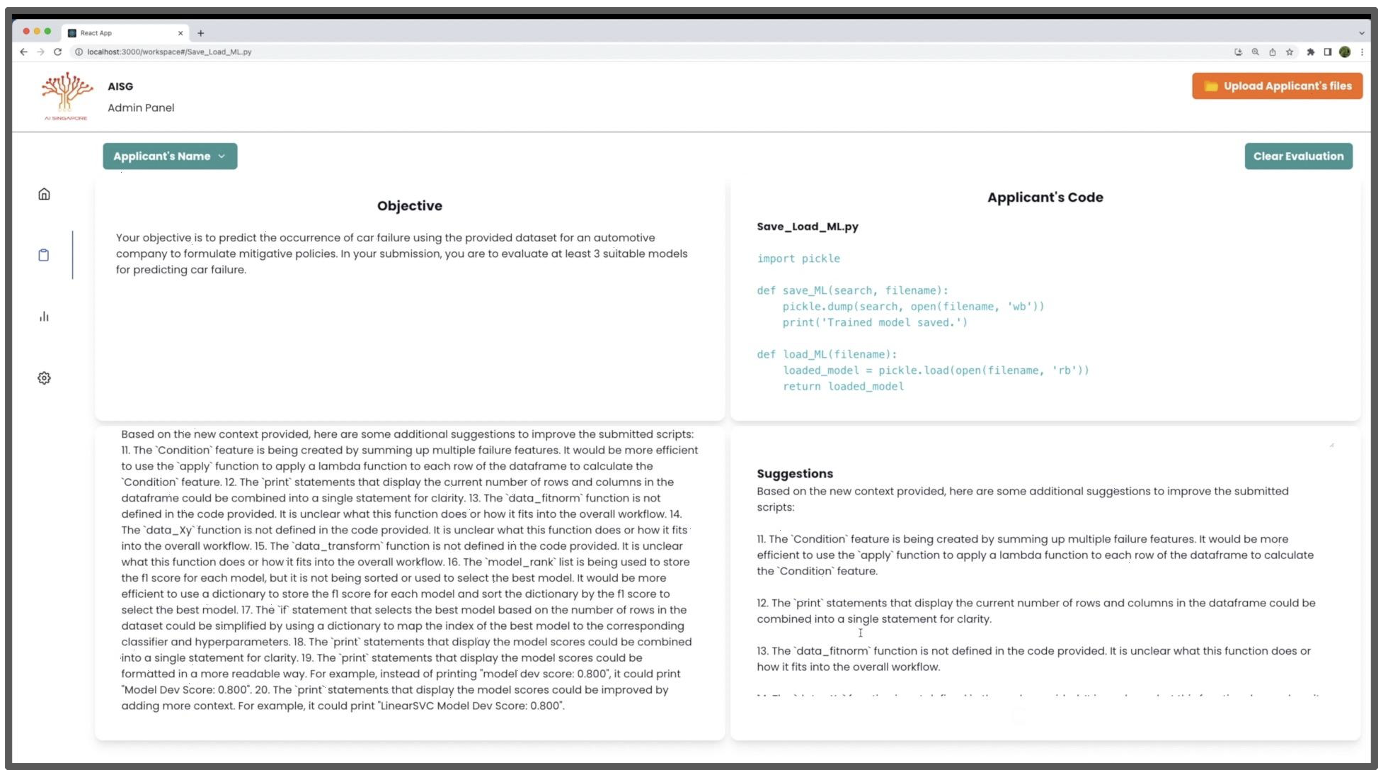
Conclusion
Many of the apprentices often have multiple offers even before they complete the programme. AI Singapore hires up to 30% of these apprentices, and the rest end up in organisations such as DSTA, Grab and DBS Bank today. Some have gone on to form their own AI startups.
Of the nearly 280 Singaporean AI apprentices trained to date, AI Singapore has retained around 50 of these apprentices as our AI Engineers in various AI Engineering roles such as AIML Ops, AI modelling, Data Engineering and AI Products teams. Many take on the role of mentors to train in-coming batches of apprentices. We also continue to hire from the industry experienced AI engineers, Singaporeans and foreigners, to supplement our home-grown team.
With Generative AI, we will be able to mentor and train more Singaporeans via AIAP and help more companies begin their 100E AI journey!
Why AIAP works is that apprentices get to work on real-world AI projects – not toy and syntactic datasets and problem statements. They get to experience what it takes to deliver an AI project to an actual customer – including all the pains of working with some demanding customers, missing or limited datasets and changing user requirements.
One of our pioneer batch of AIAP graduates who now works for the defence industry said: “There are many technical tutorials out there, but few offer the hands-on experience needed to address real-world problems, and that is one of the key differentiators of AISG’s AI Apprenticeship Programme (AIAP)®.”
We are growing our own timber – one apprentice at a time.
Author: Laurence Liew
Director of AI Innovation at AI Singapore
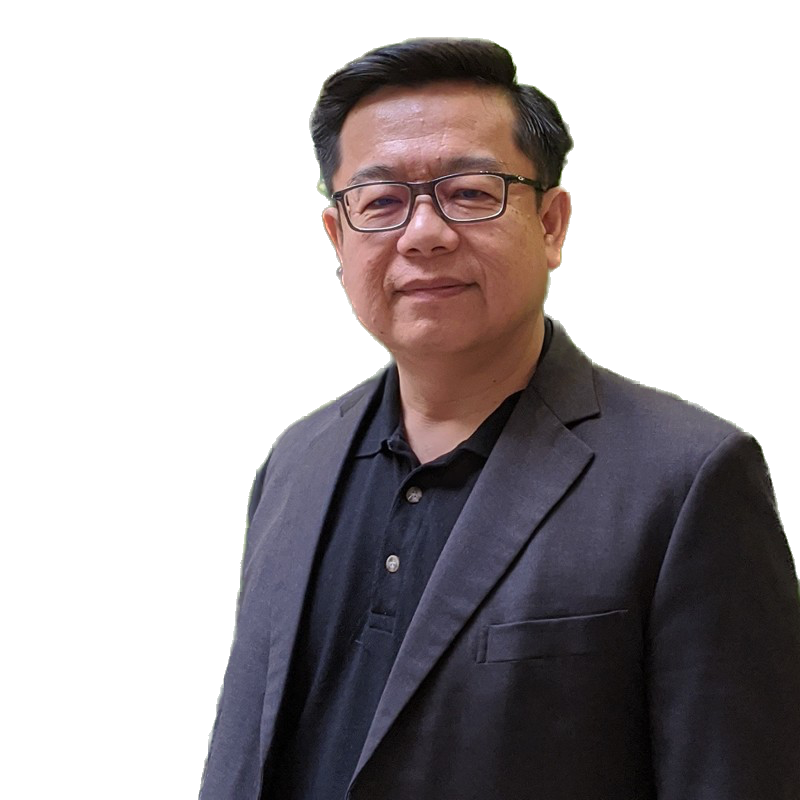
Universidad 2024 was created in collaboration with:
The Proeduca Group
PROEDUCA’s objective is to provide the best online higher education to its students and it achieves this through educational commitments at three universities: The International University of La Rioja, the Online University of Mexico (UNIR Mexico), and CUNIMAD. It also offers studies located in Peru, at the Newman Postgraduate School, and in the United States, where it has a presence through MIU City University Miami.
